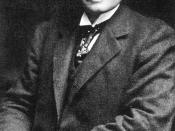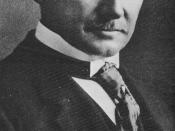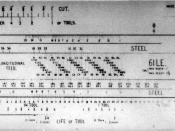The availability of powered machinery during the Industrial Revolution transformed manufacturing and mining processes. Entrepreneurs faced the issue of how to organise their production and administrative activities to exploit these advances profitably. Although domestic and export demand for manufactured goods was high, so was the risk of business failure. Economic and social considerations probably motivated their search. Incomes were very low by today's standards, and price was a major influence on demand. Manufacturers wanted to arrange their business to make the best use of the new machinery to produce large volumes of cheap manufactured goods.
Adam Smith, the Scottish economist, had written enthusiastically in 1776 of the way in which pin manufacturers in Glasgow had broken a job previously done by one man into several small steps. Charles Babbage supported and developed Smith's observations. He believed that 'perhaps the most important principle on which the economy of a manufacture depends is the division of labour amongst the persons who perform the work.
Thompson and McHugh have argued that technological innovation was not the only reason for the growth of the factory system. The fullest development and dissemination of these ideas came in the work of Frederick W. Taylor (1856-1915). An American mechanical engineer, Taylor focused on the relationship between the worker and the machine-based production systems, which by then were in widespread use. He believed that the way to achieve this was to ensure that workers reached their highest daily output. This would follow from detailed control of the process, which would become the primary responsibility of management, not of the worker. Management should concentrate on understanding the production systems, and use this knowledge to specify every aspect of the operation. He advocated five basic principles designed to help managers to achieve this greater control and predictability:
- Use...


